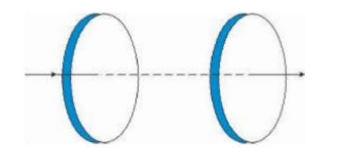Describe schematically the equipotential surfaces corresponding to - a uniform grid consisting of long equally spaced parallel charged wires in a plane.Solution in Punjabi
Step by step video & image solution for Describe schematically the equipotential surfaces corresponding to - a uniform grid consisting of long equally spaced parallel charged wires in a plane. by Physics experts to help you in doubts & scoring excellent marks in Class 12 exams.
Topper's Solved these Questions
Similar Questions
Figure 8.6 shows a capacitor made of two circular plates each of radius 12 cm, and separated by 5.0 cm. The capacitor is being charged by an external source (not shown in the figure). The charging current is constant and equal to 0.15A. Calculate the capacitance and the rate of change of potential difference between the plates. :
 06:18View Solution
06:18View SolutionAnswer the following questions regarding earth’s magnetism:A vector needs three quantities for Its specification. Name the three Independent quantities conventionally used to specify the earth’s magnetic field.
06:18View SolutionDescribe schematically the equipotential surfaces corresponding to
(a) a constant electric field in the z-direction,
(b) a field that uniformly increases in magnitude but remains in a constant (say, z) direction,
(c) a single positive charge at the origin, and
(d) a uniform grid consisting of long equally spaced parallel charged wires in a plane.View SolutionDescribe schematically the equipotential surfaces corresponding to (a) a constant electric field in the z-direction, (b) a field that uniformly increases in magnitude but remains in a constant (say, z) direction, (c) a single positive charge at the origin, and (d) a uniform grid consisting of long equally spaced parallel charged wires in a plane.
View SolutionDescribe schematically the equipotential surfaces corresponding to
(a) a constant electric field in the z-direaction .
(b) a field that uniformaly increases in magnitude but reamins in a constant (say,z) direction.
(c) a single positive charge at the origin, and
(d) a uniform grid consisting of long equally spaced parallel charged wires in a plane.03:02View Solutionव्यवस्थात्मकतः (Schematically) इन में संगत समविभव पृष्ठों का वर्णन कीजिए-
एक समतल में समान दूरी पर समांतर लंबे आवेशित तारों से बने एकसमान जाल (grid)।03:20View SolutionDescribe schematically the equipotential surfaces corresponding to (c ) A single positive charge at the origin.
03:02View SolutionDescribe schematically the equipotential surfaces corresponding to
(d) A uniform grid consisting of long equally spaced parallel charged wires in a plane.03:29View SolutionDescribe schematically the equipotential surfaces corresponding to A single positive charge at the origin.
04:07View Solutionव्यवस्थात्मकत: निम्नलिखित में संगत समविभव पृष्ठ का वर्णन कीजिए -
एक समतल में समान दूरी पर समांतर लंबे आवेशित तारों से बने एकसमान जाल।View SolutionDescribe schematically the equipotential surfaces corresponding to
a. a constant electric field in the z-direction.
b. a field that uniformly increases in magnitude but remains in a constant (say,z) direction.
c. a single positive charge at the origin, and
d. a uniform grid consisting of long equally spaced parallel charged wires in a plane.View SolutionDescribe schematically the equipotential surfaces corresponding to (a) a constant electric field in the z-direction, (b) a field that uniformly increases in magnitude but remains in a constant (say, z) direction, (c) a single positive charge at the origin, and (d) a uniform grid consisting of long equally spaced parallel charged wires in a plane.
View SolutionDescribe schematically the equipotential surfaces corresponding to
(a) a constant electric field in the z-direction,
(b) a field that uniformly increases in magnitude but remains in a constant (say, z) direction,
(c) a single positive charge at the origin, and
(d) a uniform grid consisting of long equally spaced parallel charged wires in a plane.06:56View SolutionDescribe schematically the equipotential surfaces corresponding to
(a) a constant electric field in the z-direction,
(b) a field that uniformly increases in magnitude but remains in a constant (say, z) direction,
(c) a single positive charge at the origin, and
(d) a uniform grid consisting of long equally spaced parallel charged wires in a plane.View SolutionDescribe schematically the equipotential surfaces corresponding to (a) a constant electric field in the z-direction, (b) a field that uniformly increases in magnitude but remains in a constant (say, z) direction, (c) a single positive charge at the origin, and (d) a uniform grid consisting of long equally spaced parallel charged wires in a plane.
02:37View SolutionDescribe schematically the equipotential surfaces corresponding to
(a) a constant electric field in the z-direction,
(b) a field that uniformly increases in magnitude but remains in a constant (say, z) direction,
(c) a single positive charge at the origin, and
(d) a uniform grid consisting of long equally spaced parallel charged wires in a plane.02:34View Solution

